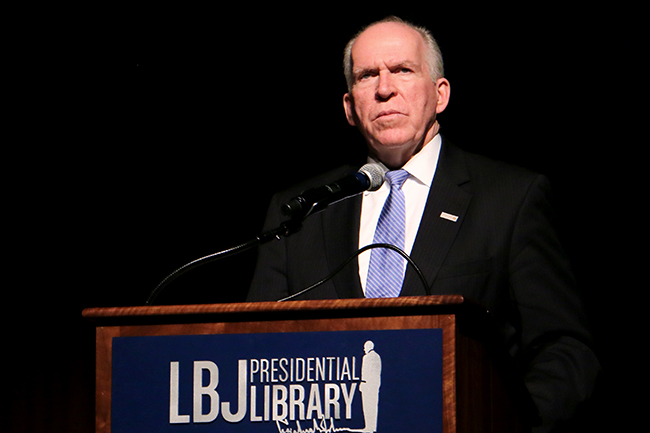CIA director John Brennan and other top officials gathered at the LBJ Library to release 2,500 previously classified presidential briefs that will shed light on decisions made by former President John F. Kennedy and former President Lyndon B. Johnson in the 1960s.
The collection of briefs contains the President’s Intelligence Checklist and the President’s Daily Briefs prepared by the CIA, which were daily summaries given to Kennedy and Johnson. The released briefs cover the periods between June 1961 to January 1969 and contain 12 billion pieces of paper, 42 million photographs, miles of film and 5 billion electronic records.
“The declassified briefs will give insight into why the president chooses one path over another when it comes to statecraft,” Brennan said. “The release of these documents affirms that the world’s greatest democracy does not keep secrets simply for secrecy’s sake. Whenever we can shed light on the work of our government without harming national security we will do so.”
This is the CIA’s 24th major release event in the last seven years, according to Joseph Lambert, director of Information Management Services at the CIA. Lambert said these are important events that don’t occur often.
“Public releases of historically significant documents like this don’t just happen. They require a tremendous amount of behind the scenes collaboration and work,” Lambert said. “Deciding whether a secret is no longer a secret can be a very difficult task.”
UT System Chancellor William McRaven spoke about the importance of national security and the vested interest the CIA has in making sure national intelligence is strong.
“The purpose of that intelligence, of course, is to mitigate the risk to a manageable level,” McRaven said. “The defense is stronger than the offense. The better the intelligence, the more likely you are to be successful against the stronger force.”
Brennan said although new technology has much potential for national security, it creates even more chances to harm that security.
“Cyber technology has created an entirely new domain for human interactions and, though presents boundless opportunities for advancing our national interest, it also enables individuals and small groups to inflict great harm on our national security,” Brennan said.
The daily briefings have evolved from notes written by the CIA to technologically advanced briefings with lengthy and sophisticated graphics and images, according to Brennan. As in the past, the CIA continues to evolve their intelligence gathering and reporting.
“We too are taking steps to optimize our relevance and our effectiveness in our own time,” Brennan said. “When the [brief] is sent to the Oval Office today, for example, it arrives on a tablet computer — an iPad — instead of paper. Indeed the transformational effect of info tech is the single most decisive factor in setting today’s world apart from the 1960s.”
Brennan said the CIA plans to release more declassified Presidential Daily Briefs in the near future.
“This is just the beginning,” Brennan said. “Some 2,000 additional declassified PDB documents from the Nixon and Ford administrations will be released next year and the process will continue.”





















